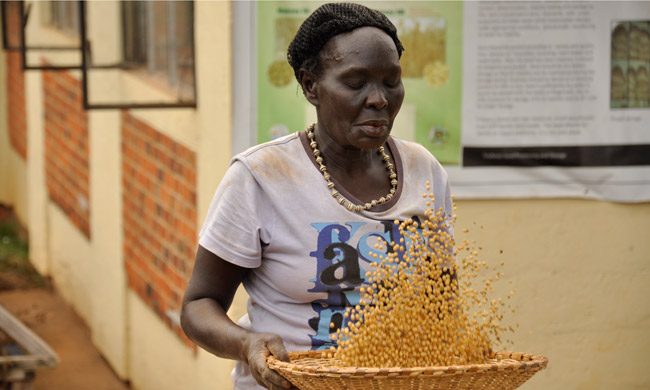Overview
Gender-responsive Researchers Equipped for Agricultural Transformation (GREAT) is a five-year collaboration between Cornell University, in the United States, and Makerere University, in Uganda. GREAT started in 2016, and is funded with support from the Bill & Melinda Gates Foundation. GREAT carries out its mission (see below) of creating more inclusive and effective agricultural systems through a combination of: the development of a Center of Excellence for gender and agricultural research at Makerere University; intensive training courses for agricultural researchers working in sub-Saharan Africa; the creation of a gender and agricultural research Community of Practice; and supporting institutional transformation for targeted agricultural research institutions across sub-Saharan Africa.
The 2019-2020 GREAT course will focus on gender-responsive plant breeding. GREAT courses are offered to multi-disciplinary project teams composed of at least one biophyiscal scientist (e.g., plant breeder) and one social scientist (e.g., sociologist, agricultural economist, etc.) working on existing agricultural research for development projects in sub-Saharan Africa.
GREAT applied gender training for agricultural researchers offers tailored skills development in gender-responsiveness for the design, implementation, evaluation, and communication stages of agricultural research projects. GREAT courses are tailored to specific agriculture disciplines and value chains, offering gender training linked to practice in agricultural research, targeted to research communities. The courses are designed to balance the depth of theory needed to internalize concepts with practical tools to apply in ongoing projects. GREAT aims to equip research teams with tools and skills to act, and move beyond “gender sensitization," and to foster meaningful change within the work cultures of their respecitve host organizations. Through the GREAT course, participants become part of a robust Community of Practice, linking them to peers across GREAT cohorts, and building up their networks with leading trainers and practitioners, to complement the skills learned during the course.
Course Objectives
The 2019-20 Gender-Responsive Plant Breeding Course will cover the following learning objectives:
- Able to articulate the concepts and principles of gender-responsive research
- Demonstrated positive practice and value for gender-responsive research
- Able to conceptualise, design and plan appropriate gender-responsive research
- Able to collect, analyze, interpret and integrate qualitative and quantitative sex-disaggregated data
- Communicate gender-responsive research to a range of audiences
Delivery Approach
GREAT uses a blended model of two face-to-face training events with field work and e- mentoring and learning in between, structured in three parts:
- Week 1 (face-to-face training): an introductory module on general theory and concepts of gender-responsiveness and applied instruction on qualitative and quantitative data collection and analysis approaches – 22-31 July 2019, in Kampala, Uganda.
- Practice (field application): practice with collection of qualitative and quantitative sex-disaggregated data from ongoing projects, supported by e-learning and e-mentoring – anytime between August 2019 and January 2020, in each participating team's respective research area
- Week 2 (face-to-face training): a data analysis, interpretation, and communications module – 13-17 January 2020, in Kampala, Uganda. Participating teams must complete all three parts for individuals in that team to qualify for certification. All face-to-face instruction will take place in Kampala, Uganda.
Further information and procedure on how to apply can be found here:
https://www.greatagriculture.org/content/courses/upcoming-courses

 General2 weeks ago
General2 weeks ago
 Natural Sciences2 weeks ago
Natural Sciences2 weeks ago
 Agriculture & Environment1 week ago
Agriculture & Environment1 week ago
 Health2 weeks ago
Health2 weeks ago
 General6 days ago
General6 days ago



